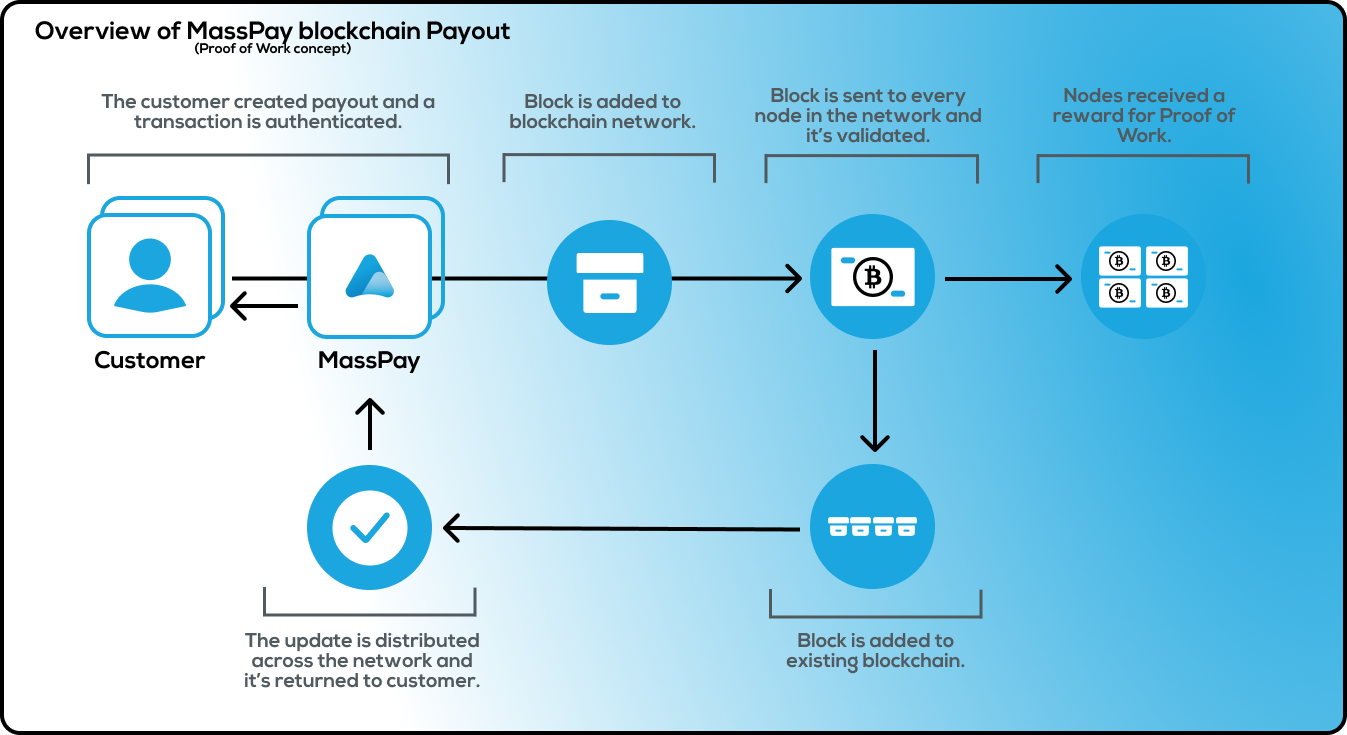Learn More About Cryptocurrencies
Cryptocurrencies continue gaining popularity as a new and alternative form of payment and payout. They offer advantages over traditional payout methods such as lower fees, faster transaction times, and increased privacy.
MassPay supports cryptocurrency payout methods, allowing you to send payouts in popular cryptocurrencies including, but not limited to, Bitcoin, Ethereum, and many others.
Using MassPay to facilitate cryptocurrency payouts is a secure and easy way to manage payouts. By integrating with MassPay's API, you can automate your payout process and reduce the time and cost associated with manual payouts.
In the following sections, we will dive deeper into how cryptocurrencies payout method works in MassPay, including the supported cryptocurrencies, the transaction process, and the associated fees.
How cryptocurrency payouts work in MassPay?

When using cryptocurrencies as a payout method in MassPay, first you need to create a payout transaction and specify the amount of cryptocurrency you wish to send to the recipient.
When it comes to payouts via cryptocurrency, MassPay provides a straightforward method. Currently, the platform does not generate a unique wallet address for the transaction. Instead, the specified amount is directly pushed to an external wallet. This means that the payee must have their own cryptocurrency wallet to receive the payout.
However, MassPay is constantly updating their services, and they have plans to add cryptocurrency custody in the future, which will allow users to generate unique wallet addresses and hold cryptocurrencies on the platform.
What cryptocurrencies are we currently supporting?
| Cryptocurrency | Code | Description |
|---|---|---|
| Avalanche | AVAX | A decentralized platform for building applications and enterprise-grade blockchain solutions. |
| Binance USD | BUSD | A stablecoin pegged to the US dollar, issued by the Binance cryptocurrency exchange. |
| Bitcoin | BTC | The world's first cryptocurrency, created in 2009, used for peer-to-peer transactions without the need for a central authority. |
| Bitcoin Cash | BCH | A fork of Bitcoin created in 2017 that aims to increase the block size limit to allow for faster and cheaper transactions. |
| Cardano | ADA | A third-generation blockchain platform that aims to provide a more secure and sustainable infrastructure for decentralized applications. |
| Dogecoin | DOGE | A meme-inspired cryptocurrency created in 2013 that has gained popularity as a fast and low-cost alternative to Bitcoin. |
| Ethereum | ETH | The second-largest cryptocurrency by market capitalization, used for creating decentralized applications and executing smart contracts. |
| Huobi USD | HUSD | A stablecoin pegged to the US dollar, issued by the Huobi cryptocurrency exchange. |
| Litecoin | LTC | A cryptocurrency created in 2011 that is similar to Bitcoin but with faster transaction times and lower fees. |
| MATIC | MATIC | A layer 2 scaling solution for Ethereum that aims to improve transaction speed and reduce fees. |
| Polkadot | DOT | A next-generation blockchain platform that aims to provide interoperability between different blockchains and allow for the creation of decentralized applications. |
| Solana | SOL | A high-performance blockchain platform that aims to provide fast and cheap transactions for decentralized applications. |
| USDC | USDC | A stablecoin (issued by Circle and Coinbase) pegged to the US dollar, used for facilitating transactions on cryptocurrency exchanges and decentralized applications. |
| USDT | USDT | A stablecoin (issued by Tether Limited) pegged to the US dollar, used for facilitating transactions on cryptocurrency exchanges and decentralized applications. |
Updated about 1 year ago
